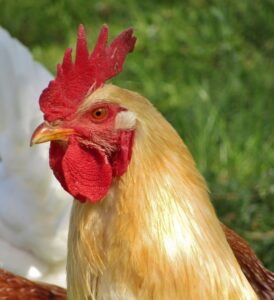It’s no secret that chickens are the divas of the homestead world—clucking personalities, feathery fashions, and drama queens when the rooster crows. But chickens, like all divas, need a bit of extra care to stay healthy, happy, and ready to rule the roost. One of the most important aspects of flock health management? Chicken immunizations.
If you’ve got questions—like “When should I vaccinate my chickens?” or “What in the world is Marek’s disease?”—don’t worry. We’re clucking here to help with a beginner-friendly guide to chicken immunizations.
What’s the deal with vaccines, anyway?
Before we start juggling syringes and vaccination schedules, it’s good to understand the basics of immunizations.
Types of Vaccines
There are different vaccines out there—live attenuated vaccines, inactivated vaccines, and subunit vaccines. Each type trains your chickens’ immune systems to fight off specific diseases, sort of like prepping them for a karate showdown with any uninvited germs.
A Quick Biology Lesson
Ever wonder how chickens’ immune systems work? Well, they have white blood cells that jump into action when a threat is detected. When vaccinated, chickens develop immunity without needing to experience the disease—yay for science.
Passive vs. Active Immunity
Imagine borrowing your super chill friend’s ability to stay calm in a crisis. That’s passive immunity—it’s temporary protection (like antibodies passed from mom to chicks). Active immunity? It’s when chickens learn to defend themselves long-term, usually after a vaccine.
Why Vaccinate?
“But my chickens seem fine without it,” you say. Sure, they might be thriving now, but like an unexpected drizzle at a picnic, threats can come when you least expect them. Immunizations help ensure your flock stays healthy year-round.
- Disease Prevention: Vaccines protect against killer chicken diseases like Marek’s or Newcastle disease.
- Flock Protection: One sick chicken can quickly turn into a full-blown coop outbreak.
- Economic Benefits: Sick chickens mean lower productivity and higher costs (vet bills aren’t cheap, folks).
- Public Health Considerations: Some poultry diseases can jump to humans. Better safe than sorry!
Your Chicken Immunization Checklist
Feeling overwhelmed? Take a deep breath (and maybe a cup of coffee). Here’s a cheat sheet of must-do vaccines and schedules to keep you organized.
- Essential Vaccines
- Newcastle Disease
- Infectious Bronchitis
- Marek’s Disease
- Infectious Bursal Disease
- Vaccination Schedule
- Chicks should get vaccines like Marek’s at just one day old.
- Pullets (teen chickens) need protection against diseases like infectious bronchitis.
- Adult Birds benefit from booster shots to maintain immunity.
- Special Breeds or show birds may require additional immunizations tailored to their needs.
How to Vaccinate Properly
Think of vaccines like your chickens’ armor—it’s only effective if you put it on correctly.
Methods Matter
There’s no one-size-fits-all here. Depending on the vaccine, administration methods might include:
- Injection Techniques (don’t worry, with practice, it’s easier than a flu shot).
- Sprays (yes, chickens get misted like models on a runway).
- Drinking Water (sneaky, but effective).
- Eye Drops (yes, really).
Handling and Dosage
Got a vaccine in hand? Awesome. But don’t forget the fine print.
- Store vaccines properly (think cool and dark—not your sunny windowsill).
- Follow dosage instructions to the letter.
- Use sterilized tools to avoid spreading bacteria—cleanliness is key in chicken-care!
Tackle Specific Chicken Woes
Some diseases demand a bit of extra strategy.
Respiratory Ailments
Boosters may be needed to fight off infections caused by overcrowding or dusty environments. Pro tip? Clean coops and good ventilation go a long way.
Viral Nasties
Handle disease outbreaks with quarantine protocols, biosecurity measures (translation: keep outsiders away from your chickens!), and tight vaccine schedules.
Keep Track Like a Pro
Vaccination is only half the game—tracking and monitoring are what separates the true homestead heroes from the rest.
- Document everything. Yes, everything. Individual bird records, flock-wide logs, and veterinary check-ins should all be noted.
- Monitor vaccine effectiveness. Are there fewer sick birds or side effects? Track and analyze.
Challenges and Practical Solutions
No system is flawless, and chicken immunizations have their quirks.
Vaccine Limitations
Not every vaccine is 100% protective (they’re more like armor than an invincibility cloak). Some diseases have multiple strains, making full protection tricky.
Managing Risks
Reduce stress for your birds during and after vaccinations—relaxed chickens are healthier chickens. Keep an eye out for side effects, and act fast in emergencies.
The Future of Chicken Immunizations
Vaccination tech is evolving faster than you can say “free-range.” From mRNA vaccines to genetic engineering, we’re entering a whole new world of precision immunizations. Pair this with good nutrition and holistic flock care, and you’ve got yourself one happy flock.
Wrapping Up (and Keeping the Coop Happy!)
Flock health management hinges on good immunization practices. From selecting the right vaccines to tracking doses like a pro, proper immunizations can make a world of difference to your coop.
For more on chicken care:
Chicken Egg Quality Enhancement
How Many Chickens do you Need?
Using Chickens for Pest Control
Navigating Chicken Zoning Laws
Chicken Respiratory Infections: Herbal Options
Fermenting Herbs for Chicken Gut Health
Chicken Foraging and Free Ranging
Best Chicken Breeds for Egg Laying
Safely Introducing New Hens to Your Flock

